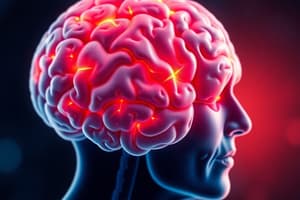Podcast
Questions and Answers
Which of the following is a subspecialty of psychology that studies the interactions between brain function and behavior?
Which of the following is a subspecialty of psychology that studies the interactions between brain function and behavior?
- Cognitive psychology
- Neuroscience
- Psychology
- Neuropsychology (correct)
What surgical operation was performed in ancient times to relieve pressure on the brain?
What surgical operation was performed in ancient times to relieve pressure on the brain?
Trephination
Who is known for the idea that mental faculties depend on the topographic organization of the brain?
Who is known for the idea that mental faculties depend on the topographic organization of the brain?
- Galen
- Hippocrates
- Descartes
- Franz Gall (correct)
The Egyptians believed the heart to be the center of the mind, sensation, and consciousness.
The Egyptians believed the heart to be the center of the mind, sensation, and consciousness.
The theory that different parts of the brain control different behaviors is known as __________.
The theory that different parts of the brain control different behaviors is known as __________.
Which philosopher is known for the phrase 'Cogito ergo sum'?
Which philosopher is known for the phrase 'Cogito ergo sum'?
Match the following historical figures with their contributions to neuropsychology:
Match the following historical figures with their contributions to neuropsychology:
What philosophical concept relates to the debate on how the material body produces the non-material mind?
What philosophical concept relates to the debate on how the material body produces the non-material mind?
Flashcards
Mentalism
Mentalism
The idea that the mind alone is responsible for behavior.
Dualism
Dualism
The theory that mind and body are separate entities, with the mind being non-material.
Materialism
Materialism
The belief that mind and behavior result solely from the function of the central nervous system.
Trephination
Trephination
Signup and view all the flashcards
Ventricular Localization Hypothesis
Ventricular Localization Hypothesis
Signup and view all the flashcards
Humors
Humors
Signup and view all the flashcards
Phrenology
Phrenology
Signup and view all the flashcards
Franz Gall
Franz Gall
Signup and view all the flashcards
Study Notes
The History of Neuropsychology
- Neuropsychology explores the complex relationship between brain function and behavior.
- The mind-body problem has fascinated humanity for centuries.
- Three classic theories attempt to explain the mind-body relationship: mentalism, dualism, and materialism.
- Mentalism suggests the mind is responsible for behavior.
- Dualism proposes a separation between the mind and body, with the mind being non-material.
- Materialism contends that mind and behavior are solely a product of the central nervous system.
- Ancient civilizations recognized the brain's role in behavior.
- Cave drawings depict the awareness of head injuries affecting behavior.
- Trephination, an ancient surgical procedure involving drilling holes in the skull, was used to relieve pressure on the brain, demonstrating an understanding of brain function.
- The Alexandrian school in Egypt made significant contributions to neuroanatomy.
- Dissection of condemned criminals helped scientists understand the nervous system.
- The ventricular localization hypothesis positioned mental and spiritual processes within the ventricles of the brain.
- The cell doctrine, which believed that mental functions resided within the ventricles, contributed to an understanding of these spaces.
- Galen, a Roman physician, advanced anatomical knowledge of the brain.
- His observations of brain injuries in gladiators helped him link specific brain regions with behavior.
- Galen believed that humors, bodily fluids, influenced physical function.
- Other notable figures in the development of neuroanatomy include Hippocrates, Albertus Magnus, Andreas Vesalius, Thomas Willis, and Giovanni Lancisi.
- Non-western cultures often emphasized spiritual and divine explanations for illness.
- Egyptian beliefs centered on a balance between internal and external forces, considering the heart as the center of the mind.
- Phrenology, a 19th-century theory, attempted to link specific mental faculties to different regions of the brain.
- Franz Gall, a prominent figure in phrenology, proposed that innate mental faculties resided in specific areas of the brain and could be determined by the shape of the skull.
Studying That Suits You
Use AI to generate personalized quizzes and flashcards to suit your learning preferences.





